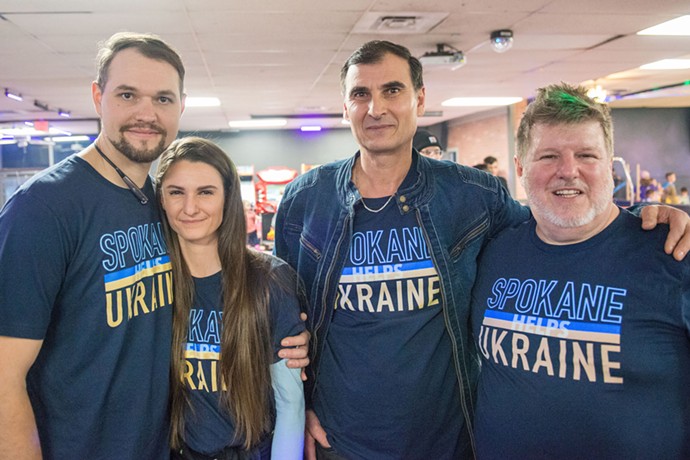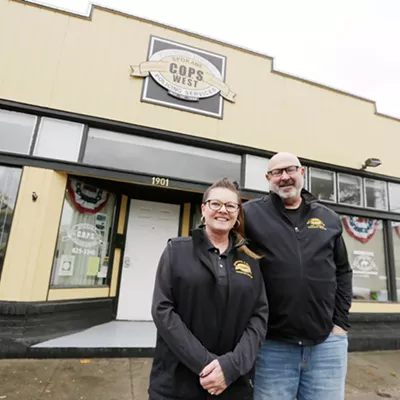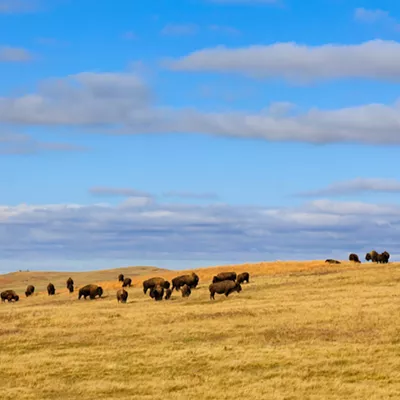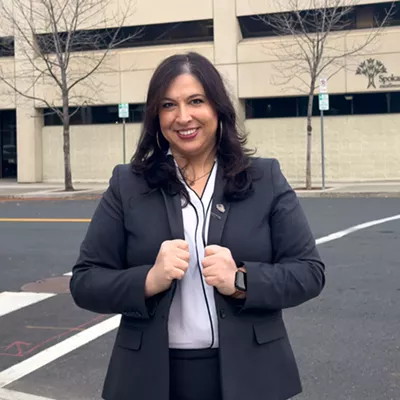
Alexander Kulabukhov is up at 5 am on Feb. 24, jolted awake by the explosions in his neighborhood. As Russian artillery fire blankets their neighborhood in Kharkiv, Ukraine, the walls of Kulabukhov's house shake. His terrified daughters are shaking, too. For the next four days, his family and their neighbors hide in their basements and cellars, dreading the next salvo, trying to decide whether to stay or flee.
He's a lifetime away from the child he once was, the kid who'd spend a day at the beach with his friend Tim, scampering up on the big logs used to mark the swimming area, diving into the water again and again.
Tim left Ukraine when Kulabukhov was only 13.
But now, as the Kulabukhovs leave behind their friends, their vehicle resale business, their school, their home, their country, as they flee across the Ukrainian border into Poland, that childhood friend has become the person who changes Kulabukhov's fate — and maybe even saves his life.
Kulabukhov calls Tim Oberemok, now owner of a thriving family-owned trucking company in Washington state, and asks if there's any way Tim can get him and his family to Spokane.
"I knew if there ever was a difficult situation, Tim will be there," Kulabukhov says.
He recounts all this, sitting in the office of Roller Valley skate center, a Spokane Valley business owned by Tim's wife, Zhanna, a Ukrainian refugee who immigrated to Spokane back when the Soviet Union fell in 1991.
Russia's invasion of its East European neighbor has flooded Spokane's Slavic community with waves of outrage and grief as they've watched their friends and family in Ukraine come under siege. It's also ignited a flurry of humanitarian activity, including efforts to bring a lot more Ukrainians like Kulabukhov to Spokane.
"The Ukrainian people are like mighty eagles with their wings clipped," says Zhanna.
In America, she suggests, they can truly fly.
In most ways, Sunday's service at Pastor Alex Kaprian's Pilgrim Slavic Baptist Church can seem indistinguishable from other Protestant churches downtown: There's the children's choir filled with squirmy kids wearing adorable bow ties, the variation of the hymn "How Great Thou Art," the impassioned sermon, the slideshow of missionaries passing out Bibles in Cuba and the announcements urging parishioners to donate to humanitarian work in Ukraine.
The big difference? The entire service is delivered in Russian or Ukrainian. Since so many Ukrainians, including Kaprian, came here as refugees fleeing the Soviet Union's religious discrimination, these often very conservative churches serve as the backbone of one of the biggest Slavic communities in the country.
Kaprian, who spent two decades working in refugee services for Washington state, estimates that there are around 50,000 Russian-speaking people in the Spokane area.
"I joke sometimes that only the KGB knows the exact number," he says.
But if his guess is accurate, Spokane has about as many Slavic people as Black, Asian, American Indian, Pacific Islander and multiracial people in Spokane County combined.
Part of it's the weather, Kaprian suggests; like Ukraine, Spokane gets all four seasons. Some of it might be the existing mix of ethnicities, including Americans with Slavic and Russian roots, which made it easier to fit in. But most of all, it's that immigration has a way of snowballing: The more Ukrainian families in Spokane, the more connections they have to any Ukrainian immigrants looking to move to America.
The Ukrainian immigrants in Spokane don't just hear about the war from the news. They get dispatches from the front from their friends and their family.
Violet Tsyukalo, who left Ukraine when she was 2, hears about a family friend who went from teaching theology classes to making Molotov cocktails in a basement. She hears from friends trapped in central Mariupol in southeast Ukraine, with no electricity, no power, no gas. The thin stream of water coming out of their faucet feels like a miracle.
Mira Zobov, who immigrated to the United States when she was 16, learns about how her former neighbors in Kharkiv are in their kitchen with friends — just down the block from Zobov's old home — when a Russian Smerch rocket smashes through their bedroom ceiling. She watches the Instagram video of the aftermath. She hears from her aunt who can see rocket launchers outside her home in the Kharkiv countryside, but who refuses to leave, preferring to "just trust in God," and stay with her chickens, dogs and cats.
Oleksandr Tarasiuk, who immigrated here just four years ago, is waving Ukrainian and American flags at the Lincoln statue on Saturday. He hears from his 52-year-old mother-in-law in eastern Ukraine, who sleeps under her table every night. One day, the fighting during the siege of her city was so intense, she fled to the forest nearby and stood there in the dark all night.
In parts of the local Slavic community, this kind of shared horror and grief can be a uniting force, even with some of the local Russians. Tsyukalo says she knows Russians who planned some of the pro-Ukrainian rallies in Spokane.
But there are also local Russians who take Putin's side. Zhanna Oberemok says this tension isn't new: There are stories of fistfights breaking out in local churches when the first Russian-Ukrainian conflict began in 2014, she says.
"It's a huge challenge for the pastors to keep the peace," says Zhanna.
So when Russia invaded this year, Kaprian says he did the same thing he did in 2014. He called together all the Slavic pastors in the area, and they agreed to a shared set of principles: They would agree to oppose war — as Christians, they were opposed to bloodshed — but they wouldn't take sides; they would focus on humanitarian aid, whether it be Russian lives or Ukrainian lives, but wouldn't get into politics.
But at times, Zhanna suggests, that taboo can feel suffocating.
"You know what is on every single person's mind," Zhanna says. "People are coming with their hearts pierced to the soul. But you can't really talk about it in the Slavic churches."
Yet there's no question the war weighs heavily on Kaprian, too. When a rocket in Ukraine hits a car full of men trying to deliver supplies to a church drug rehab facility, some of his friends are among the four killed.
But the messages Kaprian hears from those in Ukraine are neither the heroic Ukrainian propaganda splashed across Twitter nor the drumbeat of Russian disinformation blasted out from Russia Today. He hears accounts of atrocities committed by soldiers from both Ukraine and Russia, of the carnage wrought on civilians by both Russian artillery and Ukrainian munitions.
"War is war," he says.

At first, Tarasiuk wants to go back to Ukraine to fight in the war himself. He and his wife argue about it for a week. She cries. They have children — including the little boy in the Baby Yoda shirt waving the yellow and blue flag with him at the Lincoln statue downtown Saturday.
Eventually, Tarasiuk concludes he can do more good here, simply by raising money and wiring it to Ukraine. Across the entire Slavic community, Ukrainian immigrants and their allies scramble to find ways to aid both the Ukrainians suffering in the war and the newly arrived refugees.
They launch a website at SpokaneHelpsUkraine.org, sell T-shirts, cook rice pilaf and hold "Roller Skate for Ukraine" roller rink nights to raise money. Beside the tip jar at the Ukrainian-owned Cedar Coffee, blue-and-yellow ribbons sell for $3 apiece to contribute to the fund.
They collect food, medicine and clothing as well — over 6,000 pounds — though they're still trying to figure out the best way to get such a big delivery to where it's needed.
Aleks Kutsar and Pavel Turovskiy, Spokane residents who immigrated from Ukraine decades ago, say that God told them to go to Poland to help. They rent a warehouse in Poland, buy two cargo vans, and ferry food essentials like flour, rice and oil to the Ukrainian border. They also rent a house, which they use as a temporary shelter for the flood of new refugees into Poland.
"They're still in shock," Kutsar says over video chat from Poland. "We try to comfort them as much as we can, but there is not much we can do."
Other local attempts to aid Ukrainians are messier. Former Spokane Rep. Matt Shea, married to a Ukrainian immigrant, flies to Poland and ventures into western Ukraine to pick up nearly 60 orphans who had fled Mauripol. But Shea's defiant interactions with local Polish authorities, connections to a far-right Polish pastor, and the decade of controversial headlines — including an investigation that accused him of participating in domestic terrorism — sparked a kind of firestorm of rumor and controversy in Ukraine. Soon, the story was being covered by not only the Seattle Times and Rolling Stone, but a slew of local Polish news outlets as well.
Polish radio reporter Anna Gmiterek-Zabocka tells the Inlander that she was concerned about whether Shea — a "good manipulator," she says — is attempting to indoctrinate the children. In her own interview with Shea, she says, he left out the fact that he was trying to adopt four of the children from the orphanage.
Kaprian says that Shea called him and asked him to ask his congregation if there were any teachers willing to go to Poland for several months to teach the children from the orphanage. (The Polish government has committed to educating Ukrainian refugees, though their sheer numbers have strained their school system.)
Kaprian has also asked his congregation if they're interested in adopting the children from the orphanage, but is frustrated that the Ukrainian government won't allow adoptions currently. He says there's no ulterior motive to the Slavic community's efforts to adopt the children.
"The motivation is very simple," Kaprian says. "We love God. We love people. We love children. And we love especially orphans who are in need."

The bullet comes to a stop just in time. Irina Sapielkna's just outside of Kharkiv in northern Ukraine — only 60 miles from the Russian border — trying to escape with her family, when she hears a hail of gunshots.
One bullet punches through the car door and the driver's seat — through steel and plastic and fabric and upholstery and three layers of clothing — and it hits her in the back. But it doesn't go deep enough to seriously wound her. Sapielkna's daughter later finds the bullet embedded in the car seat, plucks it out and throws it away.
And now, Sapielkna and her family are safe in Spokane. She's at the Roller Valley rink in Spokane Valley, along with the Kulabukhov family and four other new Ukrainian refugee families.
Sapielkna's grateful. She's alive. For now, she says, she's put the trauma of escape behind her. She smiles and beams as she holds up her bloody shirt with the bullet hole. Her son is sleeping, slumped over beside her next to a big slice of roller rink pizza.
Zhanna says she and her husband, Tim, have connections to all six of the newly arrived refugee families here at the rink.
"We want to get our driver's license, we want to get our Social Security numbers figured out, and we want to start learning English."
tweet this
Getting here didn't just mean escaping their war-torn cities, it meant getting across the Ukrainian border — no easy task, considering it's technically illegal for Ukrainian men to leave today. Once they got to Poland, they couldn't go directly to the United States. Instead, Zhanna says, they flew to Mexico, then drove to the American border, showing their Ukrainian passports, and were granted humanitarian parole — a visa status to live in America, at least temporarily.
Last week, President Joe Biden announced the United States would be taking 100,000 Ukrainian refugees. Advocates like Kaprian and Zhanna Oberemok are waiting to learn what that means for the long list of families that could come to Spokane.
Meanwhile, Kulabukhov, Tim's childhood friend, is eager to start his new life.
"We want to get our driver's license, we want to get our Social Security numbers figured out, and we want to start learning English," Kulabukhov says. "We want to get jobs."
But it's hard, too. Spokane's housing crisis makes finding places for refugees to live particularly difficult. His kids are showing signs of homesickness. His son misses the Ukrainian soccer field. His daughter misses her music classes.
Zhanna remembers what that's like, to be a young girl thrown into a wildly different culture in a foreign land, far away from her home. But she also remembers the way her Coeur d'Alene elementary school threw her a surprise birthday party — the first real birthday party of her life — complete with a Little Mermaid cake, little party hats and a massive present filled with dozens of books donated by her classmates.
"At one point, we were on the other side of the spectrum," Zhanna says. "We came literally with nothing but a suitcase to this country,"
Welcoming more Ukrainian refugees is her way of paying that kind of generosity forward.
"It really is living the American dream," Zhanna says. ♦
















